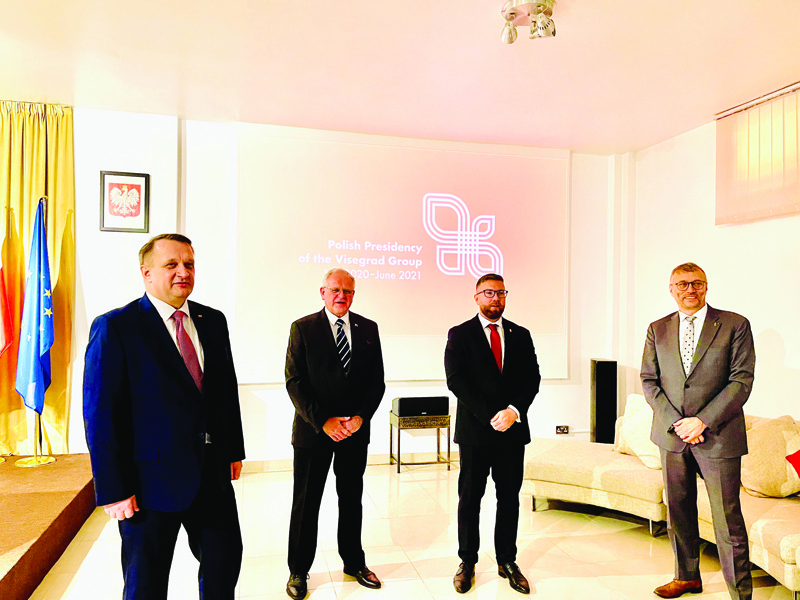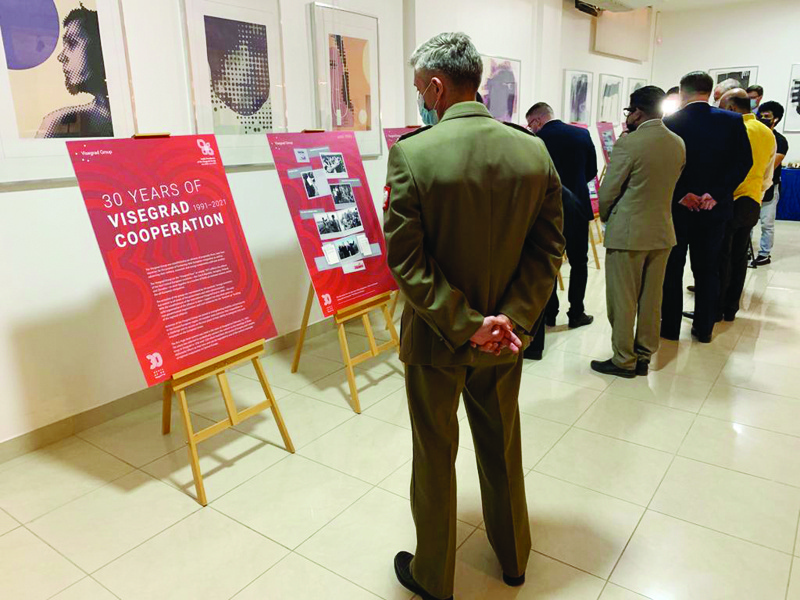 KUWAIT: Ambassadors of the V4 (Visegrad Group) countries are seen during a ceremony at the Polish embassy in Kuwait to mark the 30th anniversary of the foundation of the grouping.
KUWAIT: Ambassadors of the V4 (Visegrad Group) countries are seen during a ceremony at the Polish embassy in Kuwait to mark the 30th anniversary of the foundation of the grouping.
KUWAIT: Ambassador of Poland to Kuwait Pawel Lechowicz held a gathering of V4 (Visegrad Group) ambassadors at the Polish embassy in Kuwait last week to mark the 30th anniversary of the foundation of the grouping. On February 15, 1991, the presidents of Czechoslovakia and Poland and the prime minister of Hungary signed the Visegrad Declaration, which marked the beginning of the V4 cooperation.
The Visegrad Group Jubilee took place during the Polish Presidency, which began on July 1, 2020. A short and impressive video presentation of each of the four countries was made to the select gathering at the Polish chancery and guests were able to see the great progress made by the V4 nations during the past 30 years.
The Visegrad Group was established as an alliance of originally three, later four countries for the purpose of furthering their European integration as well as advancing their military, economic and energy cooperation with one another. The Visegrad Group reflects the efforts of the four Central European countries - the Czech Republic, Hungary, Poland, and Slovakia - to work together in a number of fields of common interest within the all-European integration.
 Visitors at an exhibition showcasing the history of the V4 nations.
Visitors at an exhibition showcasing the history of the V4 nations.
Addressing the gathering Ambassador Pawel said that the annual presidency coincided with an unprecedented crisis in the world caused by the COVID-19 pandemic. "The pandemic has put the functioning of societies to a severe test," he said.
"The motto of V4 cooperation during the Polish Presidency was 'Back on track', and our goal of building the image of the Central European region and V4 as a flexible and constructive partner remains an ongoing task. Dialogue is essential in these difficult times. Gestures of solidarity and goodwill also count. The next country to hold the presidency in the V4 Group is Hungary."
Ambassador Pawel further elaborated that the V4 countries exchange information and develop priority programs in order to better cooperate in an increasing number of areas. An important basic principle is that, within the EU, the V4 carry more weight as an alliance than they would as individual countries.
V4 and GCC comparison
In spite of the differences of the countries' economic potential and geographical differences, there are certain similarities in the cooperation between V4 countries and GCC states:
- Shared cultural and historic backgrounds: Influence of Western Christianity (Roman Catholicism), experience of II World War and post war communist regimes in V4 Group. Arab-Islamic roots of GCC states, as well as balancing influence between colonial powers (Ottoman Empire, UK).
- Social and economic level of development: GCC economies are based on oil extraction and exports. V4 countries transitioned from socialistic methods of centrally controlled economies to the ideas of free market and freedom of entrepreneurship.
- Goals: GCC seek new, other than oil-based development route for their economies. V4 Group states, as a major manufacturer of goods in Europe (heavy industry, automotive, agriculture) seek advancement to the high income - high productivity categories.
An exhibition was also on display showcasing the history of the V4 nations.










